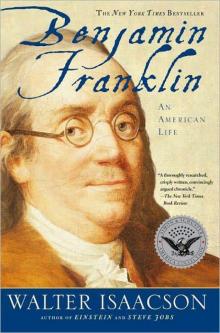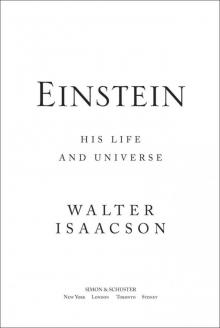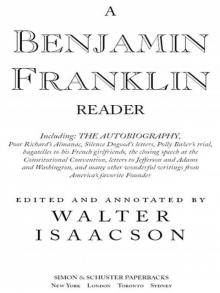- Home
- Walter Isaacson
A Benjamin Franklin Reader Page 2
A Benjamin Franklin Reader Read online
Page 2
Franklin’s father had originally intended to send the last of his sons to Harvard to study for the ministry, but observing his cheeky impertinence, especially about matters of religion, he decided that it would be a waste of money. Instead, he decided to apprentice the young boy at age 12 to his older brother James, who had learned the print trade in London and returned to Boston to open up shop and start the first feisty and independent newspaper in the colonies.
The print trade was a natural calling for young Franklin. “From a child I was fond of reading,” he recalled, “and all the little money that came into my hands was ever laid out in books.” Indeed, books were the most important formative influence in his life, and he was lucky to grow up in Boston where libraries had been carefully nurtured since the Arabella brought fifty volumes along with the town’s first settlers in 1630.
Franklin was able to sneak books from the other apprentices who worked for booksellers, as long as he returned the volumes clean. “Often I sat up in my room reading the greatest part of the night, when the book was borrowed in the evening and to be returned early in the morning, lest it should be missed or wanted.”
His favorite was John Bunyan’s Pilgrim’s Progress, the saga of the tenacious quest by a man named Christian to reach the Celestial City, which was published in 1678 and quickly became popular among the Puritans and other dissenters who settled Boston. As important as its religious message, at least for Franklin, was the refreshingly clean and sparse prose style it offered in an age when writing had become clotted by the richness of the Restoration. “Honest John was the first that I know of,” Franklin correctly noted, “who mixed narration and dialogue, a method of writing very engaging to the reader.”
A central theme of Bunyan’s book—and of the passage from Puritanism to Enlightenment, and of Franklin’s life—was contained in its title: progress, the concept that individuals, and mankind in general, move forward and improve based on a steady increase of knowledge and the wisdom that comes from conquering adversity. Christian’s famous opening phrase sets the tone: “As I walked through the wilderness of this world…” Even for the faithful, this progress was not solely the handiwork of the Lord but also the result of a human struggle, by individuals and by communities, to triumph over obstacles.
Likewise, another Franklin favorite—and one must pause to marvel at a twelve-year-old with such tastes in leisure pursuits—was Plutarch’s Lives, which is also based on the premise that individual endeavor can change the course of history for the better. Plutarch’s heroes, like Bunyan’s Christian, are honorable men who believe that their personal strivings are intertwined with the progress of mankind. History is a tale, Franklin came to believe, not of immutable forces but of human endeavors.
His writing style, as well as his belief in the power of the written word to encourage useful civic endeavors, was also influenced by two books he borrowed from his father’s little library shelf: Daniel Defoe’s Essay on Projects and Cotton Mather’s Bonifacius: Essays to Do Good. Throughout his life as an author and publisher, he believed that writing should primarily be judged by its practical effects and usefulness. He had little use for the ethereal artistic and sublime poetic aspirations of the Romantic period that was beginning to flower near the end of his life. Instead, he was an avatar of the Enlightenment, with its belief in reason, practicality, direct prose and earthly enquiry. To that he added the wit he found in Addison, Steele, Defoe and later Jonathan Swift.
His first significant published writings came when he was only sixteen and he invented the pseudonym Silence Dogood to get himself published in his brother’s paper. (His jealous brother would not have printed them if he had known the true author.) Like many other witty writers of the Enlightenment, he was partial to pseudonyms and hoaxes, and he wrote his last such piece, a purported speech by a member of the divan of Algiers defending the enslavement of Christians, on his deathbed at eighty-four.
After running away from his apprenticeship in Boston at 17, Franklin settled in Philadelphia, where he soon launched his own print shop and newspaper. He perfected various tricks of the trade to build circulation: gossip, sex, crime and humor. But he also used his pen to encourage worthy civic endeavors and, later, to push his political views. His Poor Richard’s almanacs combined humor and his penchant for self-improvement to become far and away the best-selling books of the era. And he used his talent to create a great media empire that included franchised print shops and newspapers throughout the colonies and then a distribution system, the colonial postal service, that tied them all together and helped give an advantage to his own content.
His output was wondrously diverse and prolific. He wrote pointed tales and humorous hoaxes, amusing essays, letters both chatty and sophisticated, scientific treatises, detailed charters for civic associations, political tracts, plans for uniting the colonies, propaganda pieces supporting the American cause in Britain and then France, and bagatelles to his French female friends. All together his writings fill what will be forty-two volumes, each averaging about seven hundred pages, of which thirty-seven have already been published by the masterly editors of his papers at Yale University.
In this book, I have assembled some of his most revealing, amusing and significant works. I tried to pick those that gave the best insight into Franklin’s personality and into his influence on the American character. I also chose a few of them, I must admit, simply because I found them delightful, and I want to convey what a fun (although complex) person Franklin was.
I have presented the pieces chronologically, for the most part, because they thus provide an insight into the evolution of his own life and thinking. To put them in context, they are accompanied by short introductions or explanations that draw from the biography I wrote, Benjamin Franklin: An American Life. One exception to the chronological order is the Autobiography. He wrote it in four installments, beginning in 1771 and ending in 1789 a year before his death, and I have included it all as one coherent narrative, as he intended, at the end of this volume.
Franklin’s writings likewise flow together to give a narrative of both his own pilgrim’s progress and that of the new nation he helped to shape. He was the greatest inventor of his time, but the most interesting thing that he invented, and continually reinvented, was himself. America’s first great publicist, he was, in his life and in his writings, consciously trying to create a new American archetype. In the process, he carefully crafted his own persona, portrayed it in public, and polished it for posterity.
Partly it was a matter of image. As a young printer in Philadelphia, he carted rolls of paper through the streets to give the appearance of being industrious. As an old diplomat in France, he wore a fur cap to portray the role of backwoods sage. In between, he created an image for himself as a simple yet striving tradesman, assiduously honing the virtues—diligence, frugality, honesty—of a good shopkeeper and beneficent member of his community.
But the image he created was rooted in truth. Born and bred a member of the leather-aproned class, Franklin was, at least for most of his life, more comfortable with artisans and thinkers than with the established elite, and he was allergic to the pomp and perks of a hereditary aristocracy. Throughout his life he would refer to himself, first and foremost, as a printer and writer. And it was through these crafts that he was able to influence, more than any of the other Founders, the character and personality of the American nation.
Part 1
The Young Apprentice
Silence Dogood Introduces Herself
Benjamin Franklin did not like being apprenticed to his older brother. “I fancy his harsh and tyrannical treatment of me,” Franklin later speculated, had the affect of “impressing me with that aversion to arbitrary power that has stuck to me through my whole life.” That was a bit unfair to poor James, whose newspaper in Boston, The New-England Courant, was the first feisty and independent publication in the colonies and taught young Benjamin how to be cheeky about establishment authority.
Silence Dogood was a slightly prudish widowed woman from a rural area, created by a spunky unmarried Boston teenager who had never spent a night outside of the city. Despite the uneven quality of the essays, Franklin’s ability to speak convincingly as a woman was remarkable, and it showed his appreciation for the female mind.
By creating Mrs. Dogood, Franklin invented what became the quintessential genre of American folk humor: the wry and self-deprecating homespun character whose feigned innocence and naïveté is disarming but whose wicked little insights poke through the pretensions of the elite and the follies of everyday life.
The echoes of Joseph Addison are apparent from the outset of the Silence Dogood essays. In Addison’s first Spectator essay, he wrote: “I have observed, that a reader seldom peruses a book with pleasure ’till he knows whether the writer of it be a black or a fair man, of a mild or choleric disposition, married or a bachelor…” Franklin likewise began his first Dogood essay by justifying an autobiographical introduction from his fictional narrator.
SILENCE DOGOOD # 1, THE NEW-ENGLAND COURANT, APRIL 2, 1722
Sir,
It may not be improper in the first place to inform your readers, that I intend once a fortnight to present them, by the help of this paper, with a short epistle, which I presume will add somewhat to their entertainment.
And since it is observed, that the generality of people, now a days, are unwilling either to commend or dispraise what they read, until they are in some measure informed who or what the author of it is, whether he be poor or rich, old or young, a scholar or a leather apron man, &c. And give their opinion of the performance, according to the knowledge which they have of the author’s circumstances, it may not be amiss to begin with a short account of my past life and present condition, that the reader may not be at a loss to judge whether or no my lucubrations are worth his reading.
At the time of my birth, my parents were on ship-board in their way from London to n. England. My entrance into this troublesome world was attended with the death of my father, a misfortune, which though I was not then capable of knowing, I shall never be able to forget; for as he, poor man, stood upon the deck rejoicing at my birth, a merciless wave entered the ship, and in one moment carried him beyond reprieve. Thus, was the first day which I saw, the last that was seen by my father; and thus was my disconsolate mother at once made both a parent and a widow.
When we arrived at Boston (which was not long after) I was put to nurse in a country place, at a small distance from the town, where I went to school, and past my infancy and childhood in vanity and idleness, until I was bound out as an apprentice, that I might no longer be a charge to my indigent mother, who was put to hard shifts for a living.
My master was a country minister, a pious good-natured young man, and a bachelor: he labored with all his might to instill virtuous and godly principles into my tender soul, well knowing that it was the most suitable time to make deep and lasting impressions on the mind, while it was yet untainted with vice, free and unbiased. He endeavored that I might be instructed in all that knowledge and learning which is necessary for our sex, and denied me no accomplishment that could possibly be attained in a country place; such as all sorts of needle-work, writing, arithmetic, &c. And observing that I took a more than ordinary delight in reading ingenious books, he gave me the free use of his library, which though it was but small, yet it was well chose, to inform the understanding rightly, and enable the mind to frame great and noble ideas.
Before I had lived quite two years with this reverend gentleman, my indulgent mother departed this life, leaving me as it were by my self, having no relation on earth within my knowledge.
I will not abuse your patience with a tedious recital of all the frivolous accidents of my life, that happened from this time until I arrived to years of discretion, only inform you that I lived a cheerful country life, spending my leisure time either in some innocent diversion with the neighboring females, or in some shady retirement, with the best of company, books. Thus I past away the time with a mixture of profit and pleasure, having no affliction but what was imaginary, and created in my own fancy; as nothing is more common with us women, than to be grieving for nothing, when we have nothing else to grieve for.
As I would not engross too much of your paper at once, I will defer the remainder of my story until my next letter; in the meantime desiring your readers to exercise their patience, and bear with my humors now and then, because I shall trouble them but seldom. I am not insensible of the impossibility of pleasing all, but I would not willingly displease any; and for those who will take offence where none is intended, they are beneath the notice of Your Humble Servant,
Silence Dogood
Silence Dogood On Courtship
The Dogood essays exhibit a literary dexterity that was quite subtle for a 16-year-old boy. “I am courteous and affable, good humored (unless I am first provoked) and handsome, and sometimes witty,” Mrs. Dogood writes in the second one. The flick of the word “sometimes” is particularly deft, as is his jab at redundancy when he has her promise to write “briefly, and in as few words as possible.” In addition, Franklin imbued Mrs. Dogood with that aversion to “arbitrary government and unlimited power” that he helped to make part of the American character. Having lost her husband, a minister, she is now spending time with another minister, who is teaching her a few sentences of Latin and Greek so that she can toss them into her writings in a manner that “will not only be fashionable, and pleasing to those who do not understand it, but will likewise be very ornamental.”
SILENCE DOGOOD # 2, THE NEW-ENGLAND COURANT, APRIL 16, 1722
Sir,
Histories of lives are seldom entertaining, unless they contain something either admirable or exemplar: and since there is little or nothing of this nature in my own adventures, I will not tire your readers with tedious particulars of no consequence, but will briefly, and in as few words as possible, relate the most material occurrences of my life, and according to my promise, confine all to this letter.
My reverend master who had hitherto remained a bachelor (after much meditation on the eighteenth verse of the second chapter of Genesis), took up a resolution to marry; and having made several unsuccessful fruitless attempts on the more topping sort of our sex, and being tired with making troublesome journeys and visits to no purpose, he began unexpectedly to cast a loving eye upon me, whom he had brought up cleverly to his hand.
There is certainly scarce any part of a man’s life in which he appears more silly and ridiculous, than when he makes his first onset in courtship. The awkward manner in which my master first discovered his intentions, made me, in spite of my reverence to his person, burst out into an unmannerly laughter: however, having asked his pardon, and with much ado composed my countenance, I promised him I would take his proposal into serious consideration, and speedily give him an answer.
As he had been a great benefactor (and in a manner a father to me) I could not well deny his request, when I once perceived he was in earnest. Whether it was love, or gratitude, or pride, or all three that made me consent, I know not; but it is certain, he found it no hard matter, by the help of his rhetoric, to conquer my heart, and persuade me to marry him.
This unexpected match was very astonishing to all the country round about, and served to furnish them with discourse for a long time after; some approving it, others disliking it, as they were led by their various fancies and inclinations.
We lived happily together in the height of conjugal love and mutual endearments, for near seven years, in which time we added two likely girls and a boy to the family of the
Dogoods: but alas! When my sun was in its meridian altitude, inexorable unrelenting death, as if he had envied my happiness and tranquility, and resolved to make me entirely miserable by the loss of so good an husband, hastened his flight to the heavenly world, by a sudden unexpected departure from this.
I have now remained in a state of widowhood for several years, but it is a state I never much admired, and I am apt to fancy that I could be easily persuaded to marry again, provided I was sure of a good-humored, sober, agreeable companion: but one, even with these few good qualities, being hard to find, I have lately relinquished all thoughts of that nature.
At present I pass away my leisure hours in conversation, either with my honest neighbor Rusticus and his family, or with the ingenious minister of our town, who now lodges at my house, and by whose assistance I intend now and then to beautify my writings with a sentence or two in the learned languages, which will not only be fashionable, and pleasing to those who do not understand it, but will likewise be very ornamental.
I shall conclude this with my own character, which (one would think) I should be best able to give. Know then, that I am an enemy to vice, and a friend to virtue. I am one of an extensive charity, and a great forgiver of private injuries: a hearty lover of the clergy and all good men, and a mortal enemy to arbitrary government and unlimited power. I am naturally very jealous for the rights and liberties of my country; and the least appearance of an encroachment on those invaluable privileges, is apt to make my blood boil exceedingly. I have likewise a natural inclination to observe and reprove the faults of others, at which I have an excellent faculty. I speak this by way of warning to all such whose offences shall come under my cognizance, for I never intend to wrap my talent in a napkin. To be brief; I am courteous and affable, good humored (unless I am first provoked,) and handsome, and sometimes witty, but always, sir, your friend and humble servant,

 Benjamin Franklin: An American Life
Benjamin Franklin: An American Life Einstein: His Life and Universe
Einstein: His Life and Universe Walter Isaacson Great Innovators e-book boxed set
Walter Isaacson Great Innovators e-book boxed set Steve Jobs
Steve Jobs The Innovators
The Innovators A Benjamin Franklin Reader
A Benjamin Franklin Reader